

Reinforcement vs Punishment Psychology [Examples] Reinforcement and punishment are often used as parenting tools to modify children’s behavior.
![Reinforcement vs Punishment Psychology [Examples]](http://cdn.pearltrees.com/s/pic/th/reinforcement-punishment-183049524)
Let’s review the difference between positive reinforcement and negative reinforcement, and the difference in outcomes between them. The Difference Between Positive And Negative Reinforcement In behavioral psychology, reinforcement is the introduction of a favorable condition that will make the desired behavior more likely to happen, continue or strengthen in the future1. Because the favorable condition acts as a reward, reinforcement is a reward-based operant conditioning. The Use of Reinforcement and Punishment in Shaping a Child's Behavior.
How Punishment and Reinforcement Is Effective in Reducing Oppositional Behaviour in Children. Reinforcement vs. Punishment: Changing Behavior. Being a parent has been known as the best thing ever BUT also the most challenging endeavor you will encounter in your lifetime.
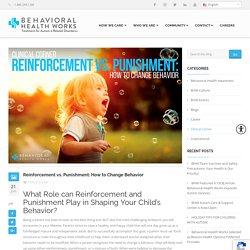
Parents strive to raise a healthy and happy child that will one day grow up as a full-fledged mature and independent adult. But to successfully accomplish this goal, a parent must set forth structure or rules throughout their childhood to help them understand and be realigned when their behavior needs to be modified. When a parent recognizes the need to change a behavior, they will likely end up using either reinforcement, punishment, or a mixture of both.
When we’re helping to decrease the frequency of a child’s negative behavior, having the reinforcement or punishment methods in our toolkit can help you modify and implement the desired behavior. Summary: The Effectiveness of Reinforcements and Punishments. References. How Negative Reinforcement is a Good Tool for Parenting Yet Often Misused. Did you know that parents could train their children to act defiant?
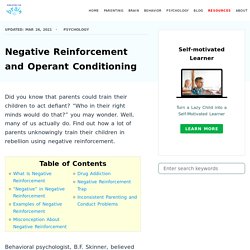
“Who in their right minds would do that?” You may wonder. Well, many of us actually do. Find out how a lot of parents unknowingly train their children in rebellion using negative reinforcement. Behavioral psychologist, B.F. In operant learning, the operant behavior is “controlled” by its consequences2. How reinforcement and punishment, when misued by parents can lead to Parent Child Coercive Cycle. The information provided in this section is intended for clients as an adjunct to their treatment at Psychological Services of Pendleton, LLC.

It may also provide useful information to the general public, but it should not be considered a substitute for psychotherapy with a psychologist or other qualified mental health professional. The Parent Child Coercive Cycle Download as PDF Terrel L. Templeman, Ph.D. This article is based upon basic principles of reinforcement and research conducted by Gerald Patterson and his colleagues at the University of Oregon and Oregon Social Learning Center.
Scenario 1 Toby, age 13, is in his room on his Xbox 360. Mom: Why aren't you doing your homework? Toby: (without looking up from the game) I don't have any homework. Mom: (yelling) What do you mean you don't have any homework? Toby: I don't understand the math we're doing and besides I forgot my book. Mom: You never bring your books home even when you have homework! Toby: Dad plays videogames! Research on effects on Children when misusing Punishment and Reinforcements leading to Parent Child Coercive Cycle. Summary: Misusing Reinforcement and Punishments When Parenting. References. How to properly use reinforcements and punishments. Proper Usage of Positive Punishment. Positive punishment is a form of behavior modification.
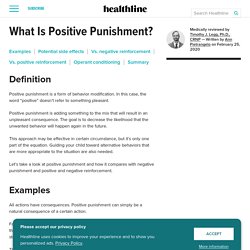
In this case, the word “positive” doesn’t refer to something pleasant. Positive punishment is adding something to the mix that will result in an unpleasant consequence. The goal is to decrease the likelihood that the unwanted behavior will happen again in the future. This approach may be effective in certain circumstance, but it’s only one part of the equation. Guiding your child toward alternative behaviors that are more appropriate to the situation are also needed.
Disciplining Your Child at Any Age. Each child is different, but most children need to be given clear rules about behavior.
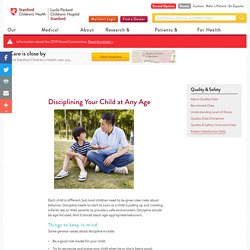
Discipline needs to start as soon as a child is pulling up and crawling. Infants rely on their parents to provide a safe environment. Discipline should be age-focused. How to Properly Use Reinforcement and Punishment - North Shore Pediatric Therapy. Summary: Proper Usage of Reinforcements and Punishments in Parenting. References. Why you should reward teens instead of punishing them. Adolescents focus most on rewards and are less able to consider the consequences of alternative actions or learn to avoid punishments, a new study has shown.
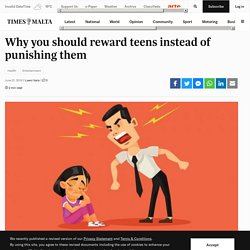
The study, conducted by University College London, showed that adolescents learned best when they were rewarded. Adolescents were less good at avoiding punishments than their adult counterparts. Adults also performed significantly better when they were told how different choices would lead to a better outcome, while teenagers didn’t seem to take that into account. The participants in the study were 18 adolescent volunteers aged 12-17 and 20 adults aged 18-32. They were asked to complete tasks in which they had to choose between different symbols. As the study proceeded, the participants learned which symbols were likely to lead to each outcome and adjusted their choices accordingly. The lead author of the study, Dr Stefano Palminter of UCL Institute of Cognitive Neuroscience, thinks the results may help with education.
Adolescent learning: rewards, punishments, and the importance of context: BOLD. Adolescents’ unique sensitivity to rewards is thought to be due to increased activity in and communication between areas of the brain that respond to rewards.
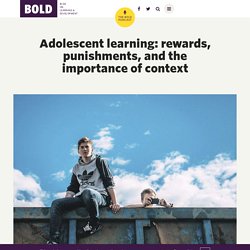
However, we also know that many of the same brain areas also respond to punishment and that there are dynamic changes occurring throughout the brain during adolescence. Much like the complexity of brain development, the story about how adolescents learn from reinforcement might not be so simple. “The way that adolescents learn from the choices that they have made in the past will ultimately influence their future choices and actions.”
An in-depth review of studies examining how we learn from reinforcement across age shows mixed results. Contrary to the idea that adolescents may learn best from rewards, some studies find that adolescents actually learn more from punishment. The context in which learning takes place may be key. Studies conducted to date have subtly varied the learning context in different, specific ways. Summary: Using Reinforcements and Punishments (Teen Specific) References.